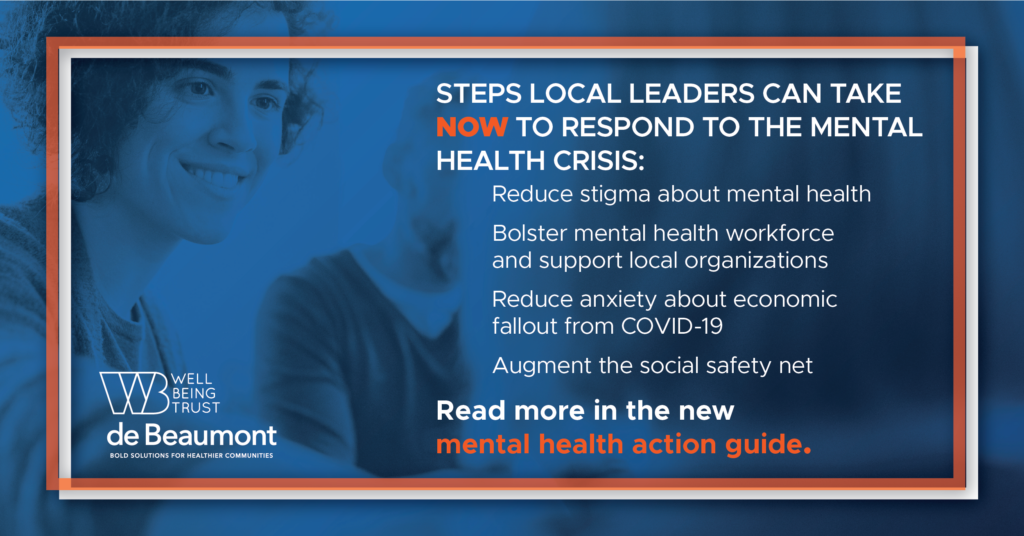For mental well-being support through COVID and beyond, visit the Resources Page.
The COVID-19 pandemic has devastated mental health and well-being among Americans. City and county leaders are on the front lines of the mental health crisis that began before COVID-19 and has been exacerbated by the grief, loneliness, and collective trauma incurred by the pandemic as well as ongoing racial injustice. But while this growing crisis is deep in magnitude, it is not surmountable — if we act now.
The de Beaumont Foundation and Well Being Trust released an action guide for local leaders that emphasizes the urgency of addressing the growing mental health and addiction issues in their communities resulting from the COVID-19 pandemic. “Supporting a Nation in Crisis: Solutions for Local Leaders to Improve Mental Health and Well-Being During and Post-COVID-19,” released in August 2020, includes more than 60 evidence-based policies, practices, and programs that can prevent further loss of life and livelihood from the nation’s growing mental health crisis. The action steps are practical, many are low-cost or revenue-neutral, and include recommendations for both the immediate response to COVID-19 and the long-term recovery.
Tyler Norris, MDiv, president and CEO of Well Being Trust, said, “This guide is a call and resource for local leaders to be accountable for community outcomes around mental health and well-being. We need to shift from engaging in a collection of projects and initiatives, to implementing system changes, policy solutions and lasting investments that can save lives.”
Brian C. Castrucci, DrPH, president and CEO of the de Beaumont Foundation, said, “It’s widely recognized that mental health and substance misuse challenges are rising, but many of these issues existed long before the COVID-19 pandemic. To developing lasting policy solutions, we need to go to the root of these problems and think beyond treatment.”
Immediate recommendations cover areas including:
- Reducing stigma about mental health
- Bolstering the local workforce to address mental health
- Supporting existing organizations providing mental health and substance misuse services
- Reducing stress, fear and anxiety surrounding economic fallout from COVID-19
- Augmenting the social safety net
Long-term recommendations can improve the vital community conditions for well-being. While many are not traditional mental health policies, they directly contribute to long-term promotion of health and well-being and prevention of disease and injury. These recommendations cover areas including:
- Providing incentives to create safe, affordable housing
- Addressing employees’ safety needs and financial concerns
- Ensuring access to green space for all people
The report also provides recommendations for supporting populations uniquely affected by COVID-19 including health professionals and first responders; people of color; youth and families; older adults; undocumented immigrants; individuals who were formerly incarcerated; individuals with substance use disorders; and victims of f intimate partner violence, child abuse, and elder abuse.
To see all the recommendations and resources, read the full report.






